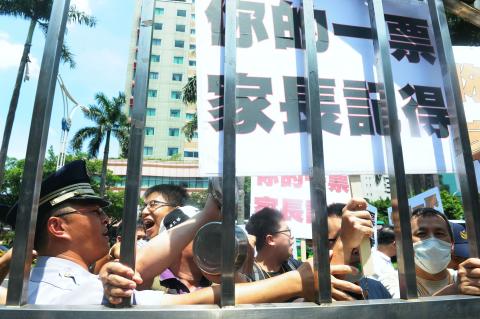|
Legislature passes
new education laws
TURNABOUT: All KMT lawmakers voted for the
party’s new proposal that a tuition-exemption threshold would be set at an
annual family income of NT$1.48 million
By Shih Hsiu-chuan / Staff reporter

Education reform advocates
demonstrate outside the Legislative Yuan in Taipei yesterday as the Chinese
Nationalist Party’s (KMT) proposed 12-year national curriculum was being
reviewed. The legislature later voted in favor of the proposed legislation.
Photo: CNA
The legislature yesterday voted in favor
of the Chinese Nationalist Party’s (KMT) proposal for a 12-year national
education program, despite President Ma Ying-jeou’s (馬英九) pledges that
senior-high schools and vocational education would be entirely tuition-free from
beginning next year, and that all students would be admitted to such schools
without entrance examinations.
Under the Senior Secondary Education Act (高級中等教育法) and the amendment to the
Junior College Act (專科學校法) passed by the legislature yesterday, an economic
threshold will be set to exclude students from more well-off households from
tuition support if they opt to study at certain senior-high schools.
The laws require that junior-high schools in each of the nation’s 15 districts
provide no less than 75 percent exam-free enrollment, while the remaining 25
percent is to be available for students through entrance examinations who wish
to attend schools with particularly strong specialties — such as mathematics and
science, fine arts, sports, nursing, computer science or music — with admission
rules varying from district to district.
Each senior-high school or vocational school must provide at least 25 percent
exam-free enrollment every year, the laws stipulate.
During the review, lawmakers of the Democratic Progressive Party (DPP), the
Taiwan Solidarity Union and the People First Party (PFP) initiated various
counterproposals to the KMT’s version, but all 64 KMT lawmakers in the 113-seat
legislature voted along the party line to defend the policy U-turn made just two
weeks ago.
According to the amendments, the 12-year education program will be composed of
the current nine years of schooling for children aged six to 15, which will be
compulsory, exam-free and free to all, as well as three years of non-compulsory
senior secondary education, to which most students will be admitted without
entrance examinations.
PFP caucus whip Thomas Lee (李桐豪) accused the Ma administration of “breach of the
principle of good faith that a state should observe toward its people” just to
save NT$2.5 billion (US$83.27 million) a year in tuition support.
“Why is the government not able to appropriate NT$2.5 billion to education?” he
said.
Education is supposed to play a role in facilitating greater social mobility,
but the admission rules for senior education under the 12-year education program
act in a diametrically opposite way, DPP Legislator Lin Shu-fen (林淑芬) said.
Given that senior-high schools admit students not only through exams, but also
their performance in various fields and that the schools are not at the same
quality levels, students will still face enormous pressures to advance to
quality schools, Lin said, adding that “students from socio-economically
advantaged families stand a better chance to get into quality schools.”
The program will start to be applied to students currently in the second year of
junior-high school when they advance to senior-high schools or vocational
schools in August next year.
The government has decided that the tuition-exemption threshold would be set at
an annual family income of NT$1.48 million. It was estimated that 14 percent of
households in Taiwan would need to pay tuition for their children enrolled in
senior-high schools.
KMT Legislator Apollo Chen (陳學聖) praised the policy on tuition fees, saying that
the nation is not financially able to support free-to-all senior education.
“The threshold was not set to exclude certain people. Rather, it means that the
14 percent of people who are well-off are offering help to the other 86
percent,” Chen said.
Lawmakers furthermore agreed that the system under which military training
instructors are stationed in senior-high schools and vocational schools will be
phased out within eight years.
|
![]()
![]()
![]()